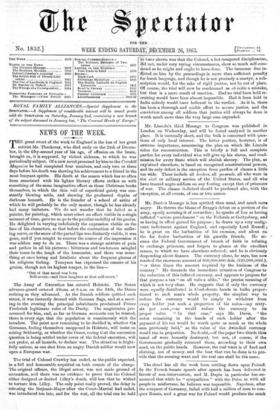The trial of Colonel Crawley has ended, as the public
expected, in a full and honourable acquittal on both counts of the charge. The original offence, the illegal arrest, was not made ground of accusation, and there was no evidence to prove that the Colonel either designed or desired Lilley's death, still less that he wished to torture Mrs. Lilley. The only point really proved, the delay in releasing the Serjeant-Major after the Court-Martial had ended, was introduced too late, and for the rest, all the trial can be held to have shown was that the Colonel, a hot-tempered disciplinarian, did not, under very trying circumstances, show so much self-com- mand as he might and ought to have done. The immense fine in- dicted on him by the proceedings is more than sufficient penalty for .harsh language, and though he is not precisely a martyr, a sub- scription would, for the sake of rigid justice, not be out of place. Of course, the trial will now be condemned as ab inilio a mistake, but that is a mere result of reaction. Had no trial been held re- cruiting would have been almost impossible. Had it been held in India nobody would have believed in the verdict. As it is, there has been a thorough and visible effort to secure justice, and the conviction among all soldiers that justice will always be done .is worth much more than the very large sum expended.






























